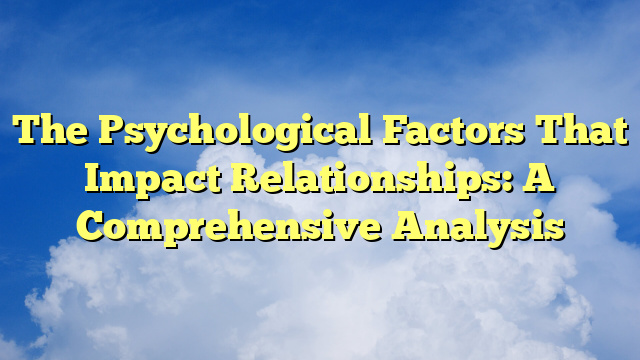The Psychological Factors That Impact Relationships: A Comprehensive Analysis
The Psychological Factors That Impact Relationships: A Comprehensive Analysis
Introduction
Relationships are an integral part of human life, and they play a crucial role in our overall well-being. However, maintaining healthy and fulfilling relationships can be challenging at times. This article aims to provide a comprehensive analysis of the psychological factors that impact relationships.
The Role of Communication
Effective communication is the foundation of any successful relationship. It involves both verbal and non-verbal cues that allow individuals to express their thoughts, feelings, and needs. Poor communication can lead to misunderstandings, conflicts, and a breakdown in the relationship.
Here are some key points to consider for improving communication in relationships:
- Active listening: Paying attention to your partner’s words, body language, and emotions can help you understand their perspective better.
- Expressing emotions: Openly sharing your feelings and emotions can foster a deeper connection with your partner.
- Respectful communication: Avoiding criticism, defensiveness, and contempt can create a safe and supportive environment for both partners.
- Non-verbal cues: Pay attention to non-verbal cues such as facial expressions, gestures, and tone of voice, as they can convey important messages.
The Impact of Trust
Trust is a fundamental aspect of any healthy relationship. It involves having confidence in your partner’s reliability, honesty, and intentions. Without trust, a relationship can become strained and unstable.
Building and maintaining trust requires consistent actions and behaviors. Here are some strategies to cultivate trust in relationships:
- Open and honest communication: Being transparent and truthful with your partner can help establish a foundation of trust.
- Keeping promises: Following through on commitments and promises demonstrates reliability and builds trust.
- Respecting boundaries: Respecting your partner’s boundaries and privacy fosters a sense of trust and security.
- Forgiveness: Learning to forgive and move forward from past mistakes can help rebuild trust in a relationship.
The Influence of Emotional Intelligence
Emotional intelligence refers to the ability to recognize, understand, and manage one’s own emotions, as well as the emotions of others. It plays a significant role in the success of relationships.
Here are some ways in which emotional intelligence impacts relationships:
- Empathy: Being able to understand and share your partner’s emotions can enhance emotional connection and intimacy.
- Emotional regulation: Managing and expressing emotions in a healthy and constructive manner can prevent conflicts and promote harmony.
- Conflict resolution: Emotional intelligence enables individuals to navigate conflicts effectively by understanding their own emotions and those of their partner.
- Supportive communication: Emotional intelligence allows individuals to provide emotional support and validation to their partners.
The Role of Self-Esteem
Self-esteem refers to an individual’s overall sense of self-worth and value. It significantly impacts how individuals perceive themselves and how they interact with others in relationships.
Here are some ways in which self-esteem influences relationships:
- Healthy boundaries: Individuals with high self-esteem are more likely to set and maintain healthy boundaries in relationships.
- Assertiveness: Having a positive self-image enables individuals to express their needs and desires assertively.
- Resilience: High self-esteem provides individuals with the resilience to navigate challenges and setbacks in relationships.
- Mutual respect: Individuals with healthy self-esteem are more likely to engage in respectful and equal partnerships.
The Impact of Attachment Styles
Attachment styles are patterns of behavior and beliefs that individuals develop in early childhood, based on their interactions with primary caregivers. These attachment styles can significantly impact adult relationships.
Here are the four main attachment styles and their influence on relationships:
| Attachment Style | Description | Influence on Relationships |
|---|---|---|
| Secure | Individuals feel secure, trusting, and comfortable in relationships. | Securely attached individuals tend to have healthier and more satisfying relationships. |
| Avoidant | Individuals are often emotionally distant and fear intimacy. | Avoidantly attached individuals may struggle with emotional closeness and commitment in relationships. |
| Anxious | Individuals crave closeness but fear rejection and abandonment. | Anxiously attached individuals may exhibit clingy behavior and have difficulties with trust in relationships. |
| Disorganized | Individuals have inconsistent and unpredictable behaviors in relationships. | Disorganized attachment can lead to difficulties in forming stable and secure relationships. |
Conclusion
Understanding the psychological factors that impact relationships is essential for fostering healthy and fulfilling connections with others. By improving communication, building trust, developing emotional intelligence, nurturing self-esteem, and recognizing attachment styles, individuals can enhance their relationships and overall well-being.

